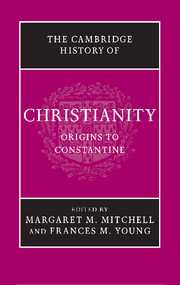Book contents
- Frontmatter
- Prelude: Jesus Christ, foundation of Christianity
- Part I The Political, Social and Religious Setting
- Part II The Jesus Movements
- 4 Jewish Christianity
- 5 Gentile Christianity
- 6 Johannine Christianity
- 7 Social and ecclesial life of the earliest Christians
- Part III Community Traditions and Self-Definition
- Part IV Regional Varieties of Christianity in the First Three Centuries
- Part V The Shaping of Christian Theology
- Part VI ‘Aliens’ become Citizens: towards Imperial Patronage
- Conclusion: retrospect and prospect
- Bibliographies
- Index
- Map 1. The Roman Empire in the time of Marcus Aurelius
- References
6 - Johannine Christianity
from Part II - The Jesus Movements
Published online by Cambridge University Press: 28 March 2008
- Frontmatter
- Prelude: Jesus Christ, foundation of Christianity
- Part I The Political, Social and Religious Setting
- Part II The Jesus Movements
- 4 Jewish Christianity
- 5 Gentile Christianity
- 6 Johannine Christianity
- 7 Social and ecclesial life of the earliest Christians
- Part III Community Traditions and Self-Definition
- Part IV Regional Varieties of Christianity in the First Three Centuries
- Part V The Shaping of Christian Theology
- Part VI ‘Aliens’ become Citizens: towards Imperial Patronage
- Conclusion: retrospect and prospect
- Bibliographies
- Index
- Map 1. The Roman Empire in the time of Marcus Aurelius
- References
Summary
The literary evidence for Johannine Christianity
The complexity of the Johannine corpus renders attempts to trace the contours of Johannine Christianity difficult. Nonetheless, the sources reveal a community of early followers of Jesus who, using an abundance of biblical symbols, defined themselves rather starkly against the Jewish milieu in which they arose. These believers cultivated an intense devotion to Jesus as the definitive revelation of God’s salvific will, and understood themselves to be in intimate contact with him and with one another, under the guidance of the Spirit-Paraclete. They were conscious of their relationship to other believers with whom they hoped to be in eventual union. Their piety found distinctive expression in a reflective literary corpus that explored new ways of expressing faith in Jesus. Their common life included ritual actions known to other followers of Jesus, but they insisted on the unique spiritual value of those rites. Disputes eventually divided the community. By the middle of the second century some representatives of the Johannine tradition achieved a respected role in the emerging ‘great church’, the interconnected web of believers throughout the Mediterranean that provided mutual support and maintained fellowship under the leadership of emerging episcopal authorities. The Johannine community of the first century bequeathed to the universal church its distinctive literary corpus and estimation of Jesus, which came to dominate the development of later Christian orthodoxy. Other representatives of Johannine Christianity, nurturing alternative strands of tradition, influenced various second-century movements, characterised by their opponents and much modern scholarship as ‘Gnostic’.
Keywords
- Type
- Chapter
- Information
- The Cambridge History of Christianity , pp. 125 - 143Publisher: Cambridge University PressPrint publication year: 2006

